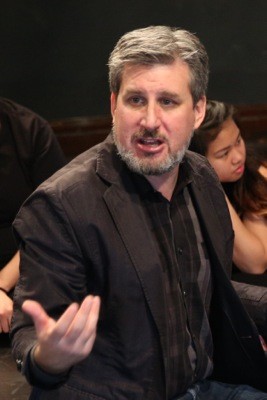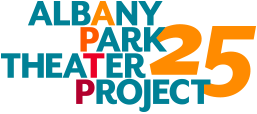Albany Park Theater Project is honored to be the recipient of this year’s $100,000 Impact Grant from Impact 100 Chicago‘s suburban chapter. Impact 100 Chicago is a women-only organization with members from all parts of the Chicagoland area. The 180 members of the suburban chapter voted to award this year’s Impact Grant to APTP to support the full-scale, world-premiere production in 2016 of Learning Curve, an innovative performance about public education that will actually place audiences within the walls of a Chicago public school and in the shoes of its students. APTP is collaborating on this groundbreaking production with Third Rail Projects, the New York-based, experimental dance-theater ensemble considered one of the foremost creators of immersive and site-specific performance.
Impact 100 members cast their votes after hearing live project presentations from 5 finalist organizations. APTP is proud to be the first-ever cultural organization to receive this chapter’s Impact Grant. All of us at APTP extend our deepest gratitude to the members of Impact 100 Chicago, especially the Culture Committee who selected us as their finalist and advocated for us. We promise that your investment in Albany Park Theater Project will truly make a difference in the world…and we can’t wait to share Learning Curve with you in 2016.
APTP’s Impact 100 presentation was made by Lilia Escobar, an alum from our Class of 2013, and David Feiner, Producing Artistic Director.

Lilia Escobar in one of her defining APTP roles in 2013's I Will Kiss These Walls.
Impact 100 Presentation
by Lilia Escobar, APTP Class of 2013
My name is Lilia Escobar, and I am an alum of Albany Park Theater Project. I devoted 3 of my high school years to APTP and I’m here to tell you just how life-changing those years were.
If you ask anyone to describe me, one of their first descriptors would be: “passionate.”
That wasn’t always me. I can tell you of a time when I was one of those kids that “wasn’t going to amount to anything.”
I am the child of two immigrants. I remember living in a one-bedroom apartment in Texas, where we had nothing but the clothes on our backs, three blankets and one pillow. I remember my first time celebrating Thanksgiving. We got really dressed up, my mom cooked us a special dinner and we danced to Salsa music all night. And we were happy. My brother and I really wanted to give our parents gifts, but we didn’t have very much. So we took household objects, wrapped them up in newspaper and in my best handwriting I wrote, “To Mami y Papi, Happy Thanksgiving!” There was so much love within the walls of that apartment.
Since that Thanksgiving, my parents have divorced, I have moved 15 times, attended 10 different schools and watched my mother juggle three jobs at a time, making barely enough to put food on our table. It was a long, long time until I felt any sense of home again.
When I walked into APTP for the first time, I was welcomed into a space of open doors, a home whose rent I could afford, a family that would stick together for better and for worse, and a set of mentors who always had the necessary words of advice. APTP showed me the first home that was not going to give up on me. Here, I was more than just another inner-city kid, another child of an immigrant, another statistic. Here, I was an artist, a storyteller, a fearless activist – and an ensemble member.
There’s a huge difference between the stories you hear on the news and the stories you can find in your own neighborhood. At APTP, I worked with other teens to interview Chicagoans and collect real stories about the struggles faced by immigrants. I was inspired by their willingness to be vulnerable and trust me with their life stories.
The year-long journey of taking their stories from an interview to the stage was transformational for me. Their words became my words, their testimony became my testimony, and their struggles became my struggle. I told these stories for three months of performances, before thousands of audience members. After every performance, people would tell me, “I had no idea these things were happening,” and, “Your performance made me want to do something about it.” At age 16, I was changing the minds of adults and inspiring them to take action.
Through the process of creating and performing Home/Land, I became more aware of issues in my country, my neighborhood – and even in my own home. My mother is an undocumented immigrant. I was fighting to prove that my mother’s existence and my existence are worth something. In APTP, I found people to stand by my side and remind me that my words and my story are worth being told.
APTP also invested in my future. They took me on my first college visits, inspiring me to imagine my future as a successful college student. APTP gave me a dream of a brighter future, and they also gave me the tools to realize that dream. APTP offered a personal tutor who I could text at any time and set up tutoring sessions. Through APTP’s college counseling program, I was able to work alongside a mentor I had known for years to handpick the perfect college for me. We worked together through the research and application process, and I was given the opportunity to make multiple college visits before I made my choice.
I am proud to say that today I am a Junior, triple major student at St. Olaf College in Minnesota. I am planning to pursue a Masters in Social Work. With the help of APTP’s college counseling program, I received $200,000 in scholarships for my education at St. Olaf. With the fearlessness instilled in me through APTP, I have taken campus leadership positions in many social justice groups and movements. Now, I am home for the summer working and doing an internship at La Casa Norte to provide resources to Chicago’s homeless families and youth.
I am just one among many young people whose lives have been transformed by the power of APTP: 100% of my graduating APTP class became the first in our families to go to college.
APTP cannot be described concisely as a theater company, or a youth program, or even set of mentors for struggling young people. We use storytelling and art to reflect the lives and struggles we live as inner-city youth. APTP helped me see the power in my voice and my own story in a way that went beyond the APTP walls.
There is a magic and beauty to this that you can hardly find anywhere. I want to devote my life to sharing this magic with silenced and unheard populations. After college, I plan to become a social worker and spread the culture of storytelling, creativity, fearlessness, and home that I found at APTP.
Here with me to share more about our project is APTP’s producing artistic director and my biggest advocate, David Feiner.

Impact 100 Presentation
by David Feiner, APTP Producing Director
Albany Park Theater Project wants to take you back to high school. Well, maybe not to your high school or my high school. We want to take you inside a struggling urban high school in Chicago.
We are asking Impact 100 to support the world premiere of Learning Curve, the most ambitious theater project in our 18-year history, which our youth ensemble will create in collaboration with New York-based Third Rail Projects.
With Learning Curve, APTP’s teens are taking on one of the most critical issues for our country’s future: the public education crisis in our city and nation.
Our teen ensemble’s collaborators on Learning Curve are Third Rail Projects, hailed as one of the foremost creators of immersive and site-specific performance.
Learning Curve will be based on dozens of interviews that our teens – dozens of future Lilia’s – conduct with students, teachers, parents, and administrators about their experiences in Chicago Public Schools. Working with adult directors and designers from Third Rail Projects and APTP, the teens will adapt these interviews into a professional theater production.
And here’s the coolest part.
Learning Curve will actually place audiences inside the walls of a Chicago public school and in the shoes of its students. With the support of Impact 100, our teens will repurpose a closed or under-utilized Chicago school building and fill it with their stories. Every audience member will have their own unique and unforgettable journey, traveling through the school building, experiencing scenes in classrooms, locker rooms, stairwells, the library, cafeteria, gym. The experience will be exhilarating, eye-opening, intimate, visceral – and unlike any theater performance you’ve ever attended.
Learning Curve will be the first theater production of its kind to be created by teenagers. As a performance that engages, surrounds, and implicates audience members, Learning Curve will challenge us with an honest but compassionate representation of urban education today – and will begin to offer a vision from students themselves of how to achieve the ideal of high quality public education for all.
APTP and Third Rail Projects have been working on Learning Curve for a year. We just closed a short run of a work-in-progress version. One audience member wrote in our guest book:
“If the whole country could see this, we could save our schools and save our children.”
With the support of Impact 100, APTP’s teens will perform a full-scale version of Learning Curve in 2016 in an actual school building. Thousands of people will see the world premiere of Learning Curve. That’s thousands of voters, policy makers, teachers, students, and parents, experiencing an unforgettable performance about public education, created and performed by students themselves.
What will be the lasting impact if you vote for Albany Park Theater Project and Learning Curve?
Teens will revitalize an old school building into a new performance space
Teens will transform the dialogue about public education in Chicago and beyond
Teens will debut a performance that showcases an exhilarating new model for live theater
Teens will give thousands of Learning Curve audience members a life-changing experience that deepens their understanding about one of the most critical issues of our time
And, teens will change the course of their own lives. Based on Albany Park Theater Project’s track record, I can promise you that 80% of the high school students involved with Learning Curve will become first-generation college graduates. That is almost 9 times the national college graduation rate for low-income students. These teens will overcome poverty, violence, discrimination, crumbling schools, and low expectations to become leaders who go forth to change the world. They will be what we at APTP call distance travelers, achieving in a single generation what it often takes immigrants multiple generations to achieve.
Toward the end of Lilia’s first year of college, she wrote me a letter describing her classes and all of her many projects on campus. She closed by saying, “I promise I am making use of my life.”
Lilia and I thank you for listening – and we ask you for your vote. And we promise that we will make use of your investment.
 Menu
Menu
